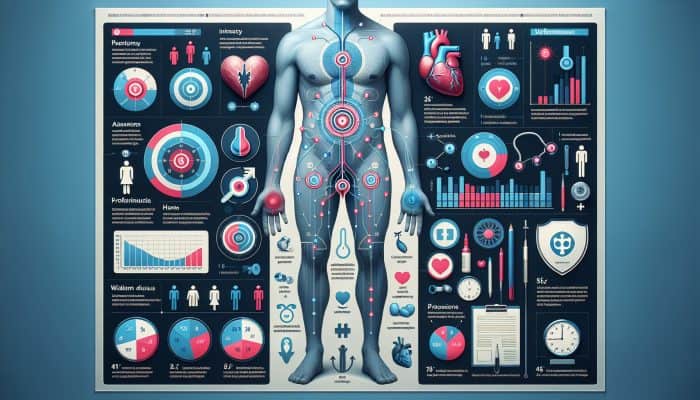Enhance Your Understanding of Men's Health Challenges in the UK
Identifying Key Health Risks Affecting Men Residing in the UK

Men’s Health and Intimacy: Within the UK, men encounter a multitude of health challenges that can severely affect their overall quality of life and mental well-being. It is crucial for every man to recognise the five paramount health issues that necessitate prompt attention and proactive management: heart disease, prostate cancer, diabetes, mental health conditions, and obesity-related illnesses. These critical health concerns are interlinked and influenced by various factors, including lifestyle choices, genetic predispositions, and environmental conditions.
- Heart disease
- Prostate cancer
- Diabetes
- Mental health conditions
- Obesity-related illnesses
These health challenges reflect a broader trend where personal lifestyle decisions, genetic factors, and socio-environmental influences play essential roles in determining health outcomes for men. Heart disease, often associated with elevated blood pressure and cholesterol levels, remains a leading cause of death among men. On the other hand, prostate cancer is particularly prevalent in older men, underscoring the urgent need for regular health check-ups to facilitate early detection. Furthermore, diabetes, especially Type 2, is on the rise due to increasingly sedentary lifestyles, while mental health issues such as anxiety and depression are affecting a considerable number of men. Additionally, obesity brings about severe health risks, not only raising the likelihood of chronic diseases but also adversely impacting mental health.
Evaluating the NHS's Role in Providing Men's Health Services
The National Health Service (NHS) plays an instrumental and supportive role in addressing the unique health needs of men through a diverse array of specialised services. Men can easily access vital health services, including routine check-ups, screenings, and consultations with healthcare professionals. The NHS provides:
- Routine health screenings for conditions such as prostate cancer and cardiovascular diseases
- Access to mental health services, including counselling sessions and various therapeutic options
- Support for lifestyle changes through comprehensive weight management programmes
- Sexual health services, including STI testing and treatment options
- Resources and information to promote a healthier lifestyle, encompassing diet and exercise guidance
Moreover, the NHS actively participates in initiatives aimed at raising awareness regarding men’s health issues. Events like Men's Health Week are specifically tailored to encourage men to seek medical advice and adopt healthier lifestyle choices. These invaluable services are essential for mitigating risks associated with prevalent health issues and enhancing overall well-being.
Increasing Health Awareness Through Focused Campaigns
Health awareness campaigns, such as Movember, have significantly influenced men's health in the UK by shedding light on critical issues like prostate cancer, testicular cancer, and mental health. These initiatives frequently motivate men to grow moustaches during November, sparking essential conversations about health and inspiring many to pursue medical consultations.
The success of these campaigns is evidenced by a marked increase in participation in health screenings and a growing willingness among men to engage in discussions about mental health. Movember, in particular, has funded numerous projects and initiatives that greatly contribute to research and support services, highlighting how community-driven efforts can yield substantial benefits. The effect of these campaigns extends beyond mere awareness, fostering a culture where men feel empowered to take charge of their health.
What Insights Do Experts Offer Regarding Men’s Health and Intimacy?

Motivating Success Stories of Health Improvements and Intimacy
Experts in the realm of men’s health often share inspiring case studies of individuals who have successfully improved their health and intimacy through proactive measures. A notable example is a 45-year-old man from London who became a member of a local men's health group. By engaging in regular physical activities, making dietary modifications, and participating in discussions with peers about mental health, he achieved an impressive weight loss of over two stone, alongside a remarkable enhancement in his intimate relationship.
To emulate such success, men can adopt actionable strategies, including:
- Joining local health or support groups to establish community connections and receive motivation
- Setting realistic health objectives and systematically tracking their progress
- Incorporating physical activities that promote cardiovascular health
- Scheduling regular health screenings to remain informed about their health status
- Practising open communication with partners concerning health and intimacy issues
By implementing these actionable steps, men can empower themselves to take control of their health while simultaneously enhancing their intimacy, creating a beneficial feedback loop that enriches both physical and emotional well-being.
Providing Expert Analysis of Current UK Health Statistics
Analysts have pinpointed alarming trends in men's health statistics in the UK, particularly over the past decade. For instance, the prevalence of obesity among men has escalated dramatically, with nearly 67% classified as overweight or obese. This worrying trend is closely correlated with rising instances of associated health conditions such as Type 2 diabetes and heart disease. Additionally, mental health statistics reveal that men are less likely than women to seek assistance, despite experiencing elevated levels of stress and anxiety.
Recent studies have also highlighted disparities in health outcomes based on socioeconomic status, with men from lower-income backgrounds facing increased risks. These trends underscore the urgent need for targeted interventions to address these inequalities. By focusing on prevention, education, and improving access to healthcare services, there exists a significant opportunity to reverse these adverse trends and enhance men’s health throughout the UK.
Implementing Effective Strategies for Improved Intimacy

Enhancing intimacy necessitates a comprehensive approach that addresses both the emotional and physical dimensions of relationships. Experts recommend several practical strategies for men seeking to strengthen their intimate relationships:
- Engaging in regular, open discussions with your partner about their desires and needs
- Prioritising quality time together, free from distractions
- Focusing on physical affection to foster closeness and connection
- Setting aside time for shared activities that encourage bonding and enjoyment
By employing these methods, men can cultivate emotional intimacy and establish a more fulfilling relationship. Recognising that intimacy encompasses not only physical aspects but also emotional bonds can transform relationship dynamics, leading to deeper connections and increased satisfaction.
How Does Diet Influence Men's Health?
Recognising the Distinct Nutritional Requirements of Men
Men possess unique nutritional requirements that can significantly affect their overall health and wellness. Vital nutrients such as protein, healthy fats, and various micronutrients are essential for sustaining energy levels, preserving muscle mass, and ensuring optimal bodily functions. Men should prioritise foods rich in:
- Lean proteins (e.g., chicken, fish, legumes)
- Healthy fats (e.g., avocados, nuts, olive oil)
- High-fibre carbohydrates (e.g., whole grains, fruits, vegetables)
- Vitamins and minerals, particularly zinc and vitamin D
A well-balanced diet that incorporates these components can assist men in maintaining a healthy weight, supporting cardiovascular health, and enhancing mental well-being. Furthermore, the significance of hydration cannot be overstated; adequate water intake is critical for optimal bodily function and performance.
Investigating the UK Dietary Guidelines for Men's Health
The UK has established specific dietary guidelines designed to effectively support men's health. These guidelines advocate for a balanced intake of various food groups, emphasising the consumption of fruits, vegetables, and whole grains while minimising the intake of processed foods and sugars. Men are encouraged to aim for at least five portions of fruits and vegetables daily, complemented by regular physical activity to maintain optimal health.
Following these guidelines not only enhances physical health but also contributes to improved mental well-being. The connection between diet and mental health is increasingly recognised, with research indicating that a nutritious diet can mitigate symptoms of anxiety and depression. By adhering to established dietary recommendations, men can significantly improve their overall quality of life.
The Significance of Nutritional Supplements for Men's Health
Nutritional supplements can play a crucial role in men’s health, particularly when dietary intake is insufficient. Men might consider using supplements for nutrients such as vitamin D, essential for maintaining bone health, or omega-3 fatty acids, known for their contributions to heart health.
Before embarking on any supplement regimen, men should consult healthcare professionals to ensure they address individual health needs without surpassing safe levels. It's vital to remember that supplements are intended to complement a balanced diet, not to replace whole foods. Regular blood tests can also be beneficial in identifying deficiencies, allowing for targeted supplementation to optimise health effectively.
Examining the Link Between Diet and Men's Mental Health
A balanced diet is crucial for sustaining mental well-being in men. Nutrients such as omega-3 fatty acids, folate, and B vitamins are particularly significant for optimal brain health. Foods abundant in these nutrients can enhance mood and cognitive function, while deficiencies may increase the risks of anxiety and depression.
Men should focus on incorporating foods that support mental health, such as:
- Fatty fish (e.g., salmon, mackerel)
- Leafy greens (e.g., spinach, kale)
- Whole grains (e.g., brown rice, quinoa)
- Fruits rich in antioxidants (e.g., berries, citrus fruits)
By emphasising these foods, men can strengthen their mental resilience and emotional stability, establishing a solid foundation for overall health.
Avoiding Common Dietary Pitfalls That Impact Men's Health
Certain dietary habits can adversely affect men's health, leading to long-term complications. Common mistakes include:
- Excessive consumption of processed foods high in sugars and unhealthy fats
- Neglecting fruit and vegetable intake
- Over-relying on red and processed meats
- Inadequate hydration
Avoiding these dietary pitfalls requires awareness and a commitment to making healthier choices. By prioritising whole, nutrient-dense foods and practising portion control, men can significantly improve their health outcomes. Recognising the impact of dietary choices empowers men to take proactive steps towards better health.
What Are the Benefits of Engaging in Regular Exercise?
Physical Health Advantages Associated with Consistent Exercise
Participating in regular exercise offers a plethora of physical health benefits for men, enhancing overall fitness and well-being. Key advantages include:
- Enhanced cardiovascular health
- Improved muscle strength and endurance
- Effective weight management
- Increased flexibility and mobility
Regular physical activity also diminishes the risk of chronic diseases such as heart disease, diabetes, and certain types of cancer. Exercise promotes better circulation and oxygen flow throughout the body, which is vital for maintaining energy levels and overall vitality. Furthermore, engaging in consistent physical activity can improve sleep quality and recovery, allowing men to perform at their best in daily life.
Mental Health Benefits Derived from Maintaining Physical Activity
The mental health benefits of an active lifestyle are equally significant as the physical ones. Regular exercise has been proven to alleviate symptoms of anxiety and depression, elevate mood, and enhance overall cognitive function.
Engaging in activities such as running, swimming, or even brisk walking releases endorphins, often referred to as “feel-good hormones,” which contribute to an improved sense of well-being. Additionally, exercise serves as a powerful stress-relief mechanism, offering a constructive outlet for frustrations while promoting mental clarity. Establishing a consistent exercise routine can build resilience and enhance emotional stability, both essential for maintaining healthy relationships.
Recommended Exercise Regimens Tailored for Men's Health
Men should consider incorporating a diverse range of exercise routines to effectively address their specific health requirements. Suggested routines may include:
- Aerobic exercises (e.g., jogging, cycling) to improve cardiovascular health
- Strength training (e.g., weight lifting) to encourage muscle mass development
- Flexibility exercises (e.g., yoga, stretching) for enhanced mobility
- High-Intensity Interval Training (HIIT) for effective calorie burning
Each of these routines targets different aspects of fitness, ensuring a well-rounded approach to health. Men should aim for a minimum of 150 minutes of moderate-intensity aerobic activity weekly, combined with strength training on two or more days to maximise health benefits.
Implementing Effective Strategies for Enhanced Men's Health and Intimacy
Real-Life Success Stories of Effective Health Strategies
Experts frequently share successful health strategies employed by men in the UK that have led to remarkable improvements in both health and intimacy. One such case involves a 36-year-old man from Manchester who adopted a holistic approach by integrating fitness, nutrition, and mindfulness practices into his daily routine. He began going to a local gym, focusing on strength training and cardiovascular exercises, while also improving his diet with nutritious foods.
These comprehensive strategies can be executed through actionable steps such as:
- Setting specific fitness and health objectives with measurable milestones
- Incorporating mindfulness practices like meditation to alleviate stress
- Utilising health apps to monitor nutrition and exercise
- Participating in social activities that foster connections and communication
By embracing these strategies, men can enhance their physical health while nurturing stronger and more intimate relationships, ultimately leading to greater overall satisfaction in life.
Expert Evaluation of Effective Intimacy Techniques
Analysts have thoroughly examined various intimacy techniques that can profoundly enrich relationships. Key methods include:
- Practising active listening to fully comprehend partner needs
- Scheduling regular date nights to prioritise connection and closeness
- Engaging in physical touch outside of sexual intimacy to deepen bonds
- Sharing experiences and hobbies to foster deeper connections and mutual interests
Implementing these techniques encourages emotional vulnerability, paving the way for a more profound connection. It is essential for men to recognise that intimacy transcends physical interactions; emotional connections form a crucial foundation that sustains healthy relationships. By actively focusing on these techniques, men can enhance intimacy and ensure their relationships thrive.
Providing Actionable Steps for Sustaining Health and Intimacy
Experts propose several practical measures that men can adopt to maintain their health and intimacy over the long term:
- Regularly schedule health check-ups and screenings
- Maintain an active lifestyle through consistent exercise
- Engage in open communication with partners about needs and desires
By embracing these habits, men can significantly enhance both physical health and intimacy. Prioritising routine check-ups facilitates early detection of potential health issues, while ongoing communication nurtures a sense of partnership and support. Collectively, these strategies improve overall quality of life and relationship satisfaction.
Exploring How Lifestyle Choices Influence Health and Intimacy
Experts assert that lifestyle choices have a considerable effect on both health and intimacy. Factors such as work hours, stress levels, and dietary habits can create obstacles in maintaining healthy relationships and personal well-being. For instance, extended working hours can lead to heightened stress, which may obstruct emotional connections with partners.
Men can initiate positive lifestyle changes by:
- Establishing boundaries to preserve a healthy work-life balance
- Prioritising self-care activities such as exercise and hobbies
- Creating family traditions to reinforce bonds with loved ones
- Practising mindfulness to manage stress effectively
By implementing these adjustments, men can enhance their overall health and intimacy, cultivating a fulfilling and harmonious life.
How Does Mental Health Affect Intimacy?
Investigating the Link Between Mental Health and Intimacy
Challenges in mental health can profoundly impact intimacy because emotional well-being is closely intertwined with relationship dynamics. Common issues that men encounter include anxiety, depression, and stress, all of which can obstruct connection and communication with partners.
When mental health struggles arise, withdrawal from intimacy often occurs, creating a detrimental cycle that negatively impacts both partners. By proactively addressing mental health, men can cultivate deeper connections and enhance their intimate relationships.
Accessing Mental Health Support Services in the UK
The UK provides a variety of support services aimed at addressing mental health challenges. Men facing difficulties can access services such as:
- Counselling and therapy through the NHS or private providers
- Support groups focused on men’s health and mental well-being
- Helplines offering immediate assistance and guidance
- Online resources providing educational materials on mental health
Utilising these services is essential for men seeking to enhance their mental health and, consequently, their intimacy. Seeking help is a sign of strength and an important step towards self-understanding and fostering healthier relationships.
Strategies for Enhancing Mental Well-being
Implementing effective strategies can significantly assist men in improving their mental well-being, which in turn positively influences their intimacy. Some prudent steps include:
- Engaging in regular physical activity to elevate mood and alleviate stress
- Practising mindfulness exercises such as meditation or yoga
- Building supportive social networks to foster meaningful connections
- Seeking professional help when necessary to address underlying mental health issues
By adopting these strategies, men can proactively manage their mental health, thereby establishing a stronger foundation for intimacy and emotional connection with their partners.
Facilitating Communication to Enhance Mental Health and Intimacy
Effective communication is crucial for promoting both mental health and intimacy. Men can enhance their communication skills by:
- Practising active listening to genuinely understand partner concerns
- Expressing feelings openly and honestly
- Utilising “I” statements to convey thoughts without assigning blame
- Scheduling regular check-ins with partners to discuss emotional well-being
By improving communication, men can cultivate a supportive environment, encouraging partners to share their feelings and thoughts freely. This openness fosters trust and strengthens emotional connections, ultimately enhancing intimacy.
The Significance of Routine Health Check-ups
Why Regular Health Check-ups Are Essential for Men
Regular health check-ups are vital for maintaining men's health, as they facilitate the early identification of potential health concerns. The advantages of prioritising these check-ups include:
- Identifying risk factors before they escalate into serious health issues
- Receiving professional advice on necessary lifestyle modifications
- Establishing a supportive relationship with healthcare providers for ongoing assistance
- Enhancing overall health literacy and personal accountability
By making regular health check-ups a priority, men can take proactive steps to manage their health and prevent complications associated with common conditions.
Essential Health Screenings for Ageing Men
Various health screenings are recommended for men as they age, including:
- Blood pressure checks
- Cholesterol tests
- Prostate cancer screenings, particularly for those over 50
- Diabetes screenings based on individual risk factors
- Mental health assessments
These screenings facilitate early intervention and personalised guidance, significantly improving health outcomes and enhancing overall quality of life.
Efficiently Navigating Health Services Across the UK
Men can effectively navigate health services through the NHS and private healthcare providers. This involves:
- Registering with a local GP for primary care
- Utilising the NHS website to discover available services and resources
- Contacting helplines for specific health concerns or queries
- Exploring private options when immediate support is necessary
Understanding how to navigate these services effectively ensures that men receive the essential care and support needed for their health requirements.
Overcoming Barriers to Regular Health Check-ups
Common barriers to regular health check-ups include time constraints, fear of potential diagnoses, and lack of awareness. Men can overcome these challenges by:
- Scheduling appointments in advance to accommodate busy schedules
- Educating themselves on the critical importance of regular check-ups
- Establishing a support system that encourages health-seeking behaviour
- Recognising that early intervention often leads to better outcomes
By addressing these obstacles, men can prioritise their health and integrate regular check-ups into their routines.
Utilising Technology for Effective Health Monitoring
Technology offers a plethora of tools for health monitoring that can be immensely beneficial for men. By leveraging apps and devices, men can:
- Track physical activity and set achievable fitness goals
- Monitor dietary habits and nutritional intake
- Receive timely reminders for upcoming health screenings and medications
- Utilise telehealth services for convenient consultations with healthcare professionals
Utilising technology not only enhances self-awareness but also empowers men to take control of their health, facilitating adherence to health objectives.
Building Strong Relationships and Nurturing Intimacy
Communication Techniques for Strengthening Intimacy
Effective communication is essential for developing strong relationships and nurturing intimacy. Men can implement several techniques to improve communication with their partners:
- Practising active listening to genuinely understand partner concerns
- Utilising open-ended questions to encourage meaningful discussion
- Expressing appreciation and gratitude regularly
- Creating a safe environment for sharing thoughts and feelings
By concentrating on these communication techniques, men can cultivate emotional connections with their partners, leading to heightened intimacy and increased relationship satisfaction.
Fostering Trust in Relationships
Trust is a fundamental element of healthy relationships and intimacy. Men can cultivate and maintain trust with their partners by:
- Consistently demonstrating reliability in both actions and words
- Honouring commitments and promises made
- Being open and transparent about feelings and concerns
- Exhibiting vulnerability to foster deeper connections
By practising these behaviours, men can establish a trustful atmosphere that serves as a solid foundation for intimacy and emotional safety within relationships.
Achieving Balance Between Work and Personal Life
Establishing a healthy balance between work and personal life is essential for nurturing intimacy. Men can implement strategies such as:
- Establishing boundaries to separate work from personal time
- Prioritising quality time for family and relationship-building activities
- Engaging in hobbies and interests that promote relaxation and joy
- Practising mindfulness to effectively manage stress and enhance focus
By maintaining a balance between work commitments and personal life, men can nurture their relationships, thereby enhancing intimacy and overall life satisfaction.
Frequently Asked Questions Regarding Men's Health and Intimacy
What are the primary health issues frequently encountered by men in the UK?
Men in the UK commonly face health challenges such as heart disease, prostate cancer, diabetes, mental health issues, and obesity-related conditions.
How can men enhance their mental health?
Men can improve their mental health by engaging in regular physical activity, seeking professional assistance when necessary, building social connections, and practising mindfulness techniques.
What dietary modifications can positively influence men's health?
Men can benefit from incorporating lean proteins, healthy fats, high-fibre carbohydrates, and essential vitamins and minerals into their diets.
What variety of exercise is recommended for optimal health in men?
Men are encouraged to participate in aerobic exercises, strength training, flexibility exercises, and High-Intensity Interval Training (HIIT) for optimal health outcomes.
How do lifestyle choices affect intimacy in relationships?
Lifestyle choices such as work hours, stress levels, and dietary habits can create barriers to intimacy, highlighting the importance of prioritising personal well-being.
What role does the NHS play in supporting men's health?
The NHS provides a range of services tailored to men's health needs, including health screenings, mental health services, and support programmes for lifestyle changes.
How often should men undergo health check-ups?
Men should aim for regular health check-ups at least annually, with increased frequency for specific health screenings as they age.
What effective intimacy techniques can couples practise?
Effective intimacy techniques encompass practising active listening, scheduling regular date nights, engaging in physical affection, and sharing meaningful experiences.
Which supplements are beneficial for maintaining men's health?
Men may find supplements such as vitamin D and omega-3 fatty acids advantageous, particularly if their dietary intake is insufficient.
How can technology assist in effectively monitoring men's health?
Technology can support men's health by providing apps for tracking fitness, dietary habits, and medication reminders, as well as facilitating telehealth consultations.
Connect with us on Facebook!
The Article Men’s Health and Intimacy: UK Focus Was First Published On https://acupuncture-frome.co.uk
The Article Men’s Health and Intimacy Insights for the UK Was Found On https://limitsofstrategy.com

